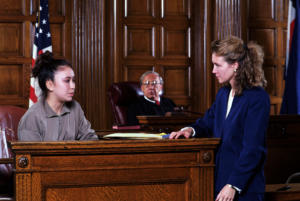The jury trial process has long been considered the cornerstone of the American legal system. As a vital component of the judiciary, jury trials ensure that justice is not only served but that the average person can play a role in the justice system. In Tennessee, as in the rest of the United States, the jury trial process is intended to uphold fairness, impartiality, and the rights of the accused. If you have been charged with a criminal offense in the State of Tennessee, you have the right to a jury trial; however, you should always consult with an experienced criminal defense attorney when deciding whether to exercise that right. In the interim, a Murfreesboro criminal defense lawyer at Bennett | Michael | Hornsby helps you to understand the jury trial
How Is the Jury Selected in a Tennessee Jury Trial?
The jury trial process in Tennessee begins with jury selection, formally referred to as “voir dire.” In Tennessee, prospective jurors are typically selected from voter registration lists or driver’s license records. The clerk will randomly summon a panel of prospective jurors to the courthouse on the date of trial. Both the prosecution and defense attorneys (and often the judge) then have the opportunity to question the prospective jurors to try and determine which ones they want on the jury. They are also listening for answers that would indicate bias or impartiality. The theoretical aim of voir dire is to end up with a diverse jury that represents a fair cross-section of the community; however, for both sides the goal is to keep as many people on the jury as possible who are likely to be sympathetic to their side.
During the voir dire process, both sides may use a designated number (based on the seriousness of the charges against the defendant) peremptory challenges to excuse potential jurors without stating a reason, though this must not be done on discriminatory grounds. Additionally, challenges for cause may be used to dismiss jurors who exhibit bias or inability to serve impartially. For example, if a prospective juror has personal knowledge of the case or of someone involved in the case, that juror might be excused “for cause.” Challenges for cause require the attorney making the challenge to convince the judge that cause exists to excuse the juror whereas peremptory challenges do not require an explanation.
Opening Statements
Once the jury is empaneled, the trial proceeds with opening statements from both the prosecution and the defense. These statements serve as a roadmap for the jury, outlining the key arguments, evidence, and legal theories that will be presented during the trial. The goal is to deliver a persuasive opening statement that captures the attention of the jury and sets the tone for the proceedings.
Evidence and Testimony
The prosecution always goes first in a trial because the State has the burden of proving a defendant’s guilt beyond a reasonable doubt. The defense is not required to present any evidence or testimony, although they usually do. Following opening statements, the prosecution presents its case in chief through the examination of witnesses and introduction of evidence. In Tennessee, the rules of evidence govern the admissibility of evidence, ensuring that only relevant and reliable information is presented before the jury. The defense has the right to cross-examine witnesses and challenge evidence the prosecution wishes to admit. Often, challenges to the admissibility of evidence occur before the trial, through pre-trial motions to exclude evidence; however, testimony and evidence can be challenged during the trial as well.
After the State rests, the defense presents its case, calling witnesses and introducing evidence to refute the prosecution’s allegations. Because the defense does not have the burden of proving anything, the defense strategy may be to essentially focus on the State’s failure to make its case. Whether the defendant testifies at trial is an important decision that should only be made after extensive consideration by the defendant and the defendant’s defense attorney.
Jury Deliberation
Before the case goes to the jury for deliberation, the judge provides instructions on the relevant laws and legal standards that the jury must apply in reaching its verdict. Both sides can submit suggested jury instructions to the judge prior to trial. Ultimately, however, the judge decides what instructions are read to the jury and the jury is obligated to use those instructions when deliberating.
Once the jury has been properly instructed, they retire to the jury room to deliberate on the case. To reach a verdict of guilty, it must be unanimous, meaning that each jury votes for “guilty.” Once the verdict has been reached, the jury returns to the courtroom, where the verdict is read aloud.
Contact a Murfreesboro Criminal Defense Lawyer
If you have been charged with a criminal offense in the State of Tennessee, consult with an experienced Murfreesboro criminal defense lawyer at Bennett | Michael | Hornsby as soon as possible. Contact the team today by calling 615-898-1560 to schedule your free appointment.
- The Art of Successful Co-Parenting During Divorce - April 19, 2024
- Elder Financial Exploitation: How to Protect Seniors - April 12, 2024
- How to Obtain Guardianship of a Minor in Tennessee - April 2, 2024




